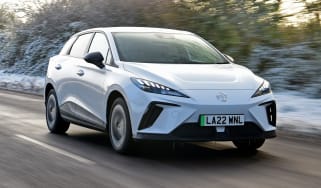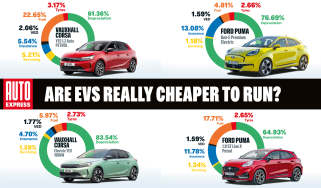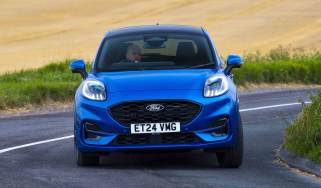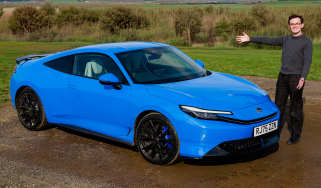How to buy an electric car
Thinking of making the switch to electric? We explain everything you need to know about buying an EV

Electric cars are rapidly growing in popularity in the UK and will soon take over the market as manufacturers work towards ever-tightening emissions regulations and sales targets. It’s more likely than ever that new car buyers will be considering going electric, so we’re here to help make that EV buying process a little easier.
The breadth of information presented when buying an electric car can be confusing, especially if you’re coming from a petrol or diesel model. Range is a major concern for many, with charging speeds and efficiency often difficult to understand for those used to unleaded and miles per gallon. In this guide well explain what really matters and how to get the best EV for your needs.
How to choose an electric car: things to consider
Here are the key things our experts think you consider when choosing your first electric car…
Model type and size
It’s pretty obvious, but deciding what kind of electric car you need should be the first step in the buying process. The electric car market has rapidly expanded in recent years so there’s no shortage of choice, from tiny city cars to huge luxury SUVs, via pick-up trucks, saloons, MPVs, sports cars and more.
It’s a good idea to figure out how many people are likely to be in the car most of the time, then expand your general use-case from there. How often do you carry adults in the back? How many child seats need to fit? Is there room for the dog? To many this will be obvious but it’s not uncommon for buyers to end up with a car that’s a touch too small or too big, and with the modern electric car market continuing to blur lines between segments, it pays to know exactly what you need and avoid the temptation of an unsuitable vehicle.
The point on size is particularly important with electric cars, as weight and aerodynamics play a big part in overall efficiency. If you choose a much larger car than you need then you’ll essentially be paying to push a bigger object through the air, and carry around the associated extra weight of its larger battery. You’ll end up spending more charging as a result.
The same applies with petrol and diesel cars of course, but with some of the largest electric cars weighing in at over three tonnes and many 'ordinary' models coming in over two tonnes, it’s a point worth considering.
Range, battery size and efficiency
Range is an important factor to consider when buying an electric car but is often given too much weight in buying decisions.
It’s best to imagine the quoted range figure as the fuel tank size of an internal combustion car, with the claimed efficiency figure being more like expected miles per gallon. It’s the latter that most people will be concerned with when buying a petrol or diesel car – greater efficiency equates to cheaper running costs. It should be the same with EVs.
Serious consideration about exactly how much range you need can help hone your choices to much more affordable models than you might have otherwise considered. It’s a good idea to consider a week or even a month’s average mileage, taking into account commuting, trips to the supermarket and other everyday driving, as well as the frequency of any longer trips.
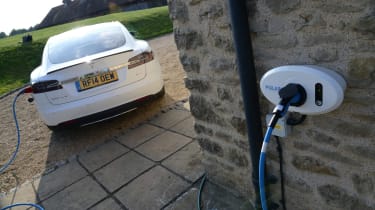
If you use your car locally for a short commute, even the shortest-range modern electric car could be a perfect fit. If a car is needed for family duties and needs to take on longer weekend trips, a larger battery with more range makes sense – but even shorter-range cars can drive long distances if you are prepared to rely on the UK’s ever-improving network of rapid chargers.
Remember, while larger batteries offer more range, they also weigh more and take longer to charge up. In many cases, a small- to medium-sized unit is more than enough, offering a great balance between efficiency, range, charging speed and outright cost.
Charging type and speed
The vast majority of new electric cars can be charged in three ways: via a cable with a three-pin domestic plug, via Type 2 cable, or by rapid charging via CCS or CHAdeMO. The first of these is generally recommended as a last resort, and the latter is best used for a quick top-up on a longer journey. To make the most out of the potential savings electric cars can offer, it’s the middle option that you’ll be using most.
Most modern electric cars can charge at up to 22kW by a Type 2 cable, either at a public charger or via a home wallbox – although home speeds are usually slower than this. When buying an electric car it is important to figure out your likely charging habits and to make the necessary arrangements where applicable – be it installing a home wallbox or investigating your local public charger situation.
If you plan to spend a lot of time on the open road in your electric car on longer trips, rapid-charging speed is an important factor. Many electric cars top out at 50kW, with many more modern models sporting 100kW capability and beyond. The larger the number, the faster your car can theoretically charge – although this also depends on the speed of the charger itself.
Most manufacturers will quote a 10–80 per cent charge time to give a rough idea of how long a typical on-the-fly stop would take, but it’s worth remembering that this figure will be based on using a charger than can match a car’s charging capability. Many top-end cars currently have capability far beyond the limits of the current infrastructure, so take these speeds with a pinch of salt. As a general rule, however, faster is better – especially if you want to spend less time at chargers on longer trips.
Optional extras
Electric cars are generally very well equipped, with their all-electric architectures allowing for sophisticated infotainment, driver assistance and active safety features. Options are often limited to trim colour, uprated stereo systems and exterior paint finishes.
Some options are more important, however. Heat pumps can help increase efficiency and are often optional equipment; these are always worth adding if you can stretch to it. A three-pin plug is sometimes offered as standard but is worth adding if not – it’ll come in handy if you’re stuck without a charge. And on the theme of emergency equipment, a physical spare wheel is always worth optioning on any car – electric or otherwise.
Servicing
The vast majority of manufacturers will offer some kind of service plan alongside their new electric cars. This is often worth considering, as although electric cars are generally much cheaper to service than their internal combustion counterparts, costs can still stack up over an ownership period.
If you plan to keep your electric car beyond the most common three- or four year period, consider budgeting for new tyres – even the least powerful examples have lots of torque and can wear through rubber quicker than you may be used to.
Where to buy an electric car
Once you’ve chosen the right kind of EV, it’s time to think about where to buy it.
Car dealers
A franchised car dealership is the main route for car manufacturers looking to put their products on your driveway. Sales staff are usually experts on the cars they sell and will be best placed to help with any questions.
Purchasing through a credible dealership will usually buy the best support when it comes to repairs and warranty work. It can also be the best place to part-exchange your current car.
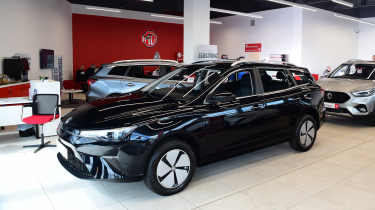
A franchised dealer will usually only sell models from that franchise, limiting how many different cars you can look at on-site. Everything in the showroom will be tailored to show the cars in the best possible light, and there should be a smorgasbord of brochures to get stuck into.
If you don’t mind a pre-registed car – often a good route to a deal – franchised dealers will have access to a wealth of manufacturer approved used and nearly new models. The great benefit of these cars is that they will often be covered by a used car warranty and the approved system should guarantee their quality.
A franchised dealer should also prove extremely flexible with their finance offers, mostly due to the fact they have the backing of the manufacturer's finance department. On top of this, the majority of dealers will have a finance expert on site, so all the options available to you can be explained clearly.
As with all sales there will be room to negotiate as sales targets must be met – be sure to use this to your advantage.
Car brokers
Using a car broker can be an excellent way of saving some effort by letting an experienced negotiator get a great deal on your behalf.
A key point is that the dealership the car comes from should pay the broker to source the car – not you. Reputable and successful car brokers will have plenty of customer reviews for you to ensure you are going to get great service.
As car brokers work by ordering cars from dealers in large numbers, there is always the chance you will not get offered the exact car you were after, and while this can be as simple as a colour change, it can also mean bigger changes such as a trim level or optional equipment. There is the risk that the broker will offer you cars from dealers they can get the best commission on, so it pays to proceed with caution.
Car supermarkets
Car supermarkets are just what they sound like – a large collection of a huge mix of makes and models of cars. However, unlike franchised dealers, the cars will all be used, or nearly new, usually bought in bulk as ex demonstrators, part exchanges, or pre-registered vehicles from manufacturers.
Generally speaking, the biggest advantage is the variety on offer. The majority of the cars on offer will be the mainstream winners as these supermarkets are in the business of selling large numbers of cars – and increasingly, stock is shifting to reflect the market’s appetite for electric cars.
As you find in the franchised dealers, a raft of flexible finance deals will usually be offered, which will allow more buyers to find the right deal.
A point to bear in mind is that all other aspects of car ownership, such as servicing, maintenance and recall work, will most likely not be covered by the car supermarket as they will not have the facilities. Some do offer warranties, however, so check before you buy.
How to pay for an electric car: Leasing and PCP
As with most new cars, getting a good lease or personal contract purchase (PCP) deal generally makes a lot of sense when buying a new electric car.
A major benefit of these options is the protection they offer a buyer. Depreciation can be a concern for electric car buyers, but a PCP contract will protect you from taking an extra hit on the depreciation because you should be able to simply walk away from the vehicle and get into your next.
In effect, as long as the deposit and monthly payments are agreeable to you, it makes the rest of the equation – including the key point of residual values – the manufacturer’s problem.
We would currently advise against buying a brand new electric car outright with cash unless the process of speccing your own car is important to you. Depreciation for electric cars can be high versus internal combustion models, so it’s almost always a better idea to let someone else take the first-year hit at the very least if you are a cash buyer.
When is the best time to buy an EV?
The car market has experienced a period of unprecedented turmoil over recent years, with supply and demand issues caused by the global pandemic and geopolitical disruption. To an extent, this has caused the usual seasonality and demand patterns in the market to be disrupted, but this has returned to something more like normality in recent months.
Generally speaking, electric cars and hybrids fall into the same sales patterns as regular cars, so the best time for deals is around the registration plate changes in March and September.
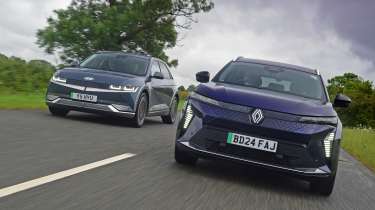
Government grants can help take a decent chunk off the price of a new electric car and while the original Plug-in car Grant scheme ended in June 2022, the new Electric Car Grant arrived in 2025 to take up the slack. There are also plenty of deals to be had as manufacturers work to meet tight sales quotas for low-emissions cars.
Some manufacturers roll EV sales into their sales staff bonus schemes – so if they want the extra money for a good quarter’s sales of petrol cars, they also need to shift a few EVs.
Does it cost more to insure an EV?
Typically, no. Some insurers may even offer you a small discount on a policy for an EV, because of its environmental credentials and the fact that owners of pure-electric cars tend to rack up fewer miles and, because they’re used mainly in towns, at lower speeds. However, some cover providers still believe there’s an added risk because of the charging equipment, or even the possibility of people tripping over your cable if the car is plugged in on the street.
Factor in higher list prices of electric cars and plug-in hybrids, and you end up with a final bill that’s likely to be roughly the same as it would be for a conventionally powered vehicle. As always, it pays to shop around.
How much does it cost to service an electric car?
Service bills will vary from vehicle to vehicle, of course – and you’ll also see a difference between the costs for pure EVs and hybrid cars. That’s because all-electric vehicles have fewer moving components than anything with an internal combustion engine.
Buy a car with Auto Express. Our nationwide dealer network has some fantastic cars on offer right now with new, used and leasing deals to choose from...
Your electric car questions answered
- Electric car FAQ
- Should i buy an electric car?
- What’s the best way to buy an electric car?
- Is a hybrid, plug-in hybrid or electric car right for me?
- Should i buy a used electric car?
- Can i get a plug-in car grant?
- How is electric car range calculated?
- How much do electric cars cost to charge?
- How much do electric cars cost to run?
- How long do electric car batteries last?
- What happens to old electric car batteries?
- Should i get a heat pump on my electric car?
- What are fast charging and rapid charging?
- Should i get a home electric car charger?
- Can i tow with an electric car?
- Is wireless electric car charging the future?
- What’s the history of the electric car?
Ready to make your purchase? Now take a look at the best electric cars...







